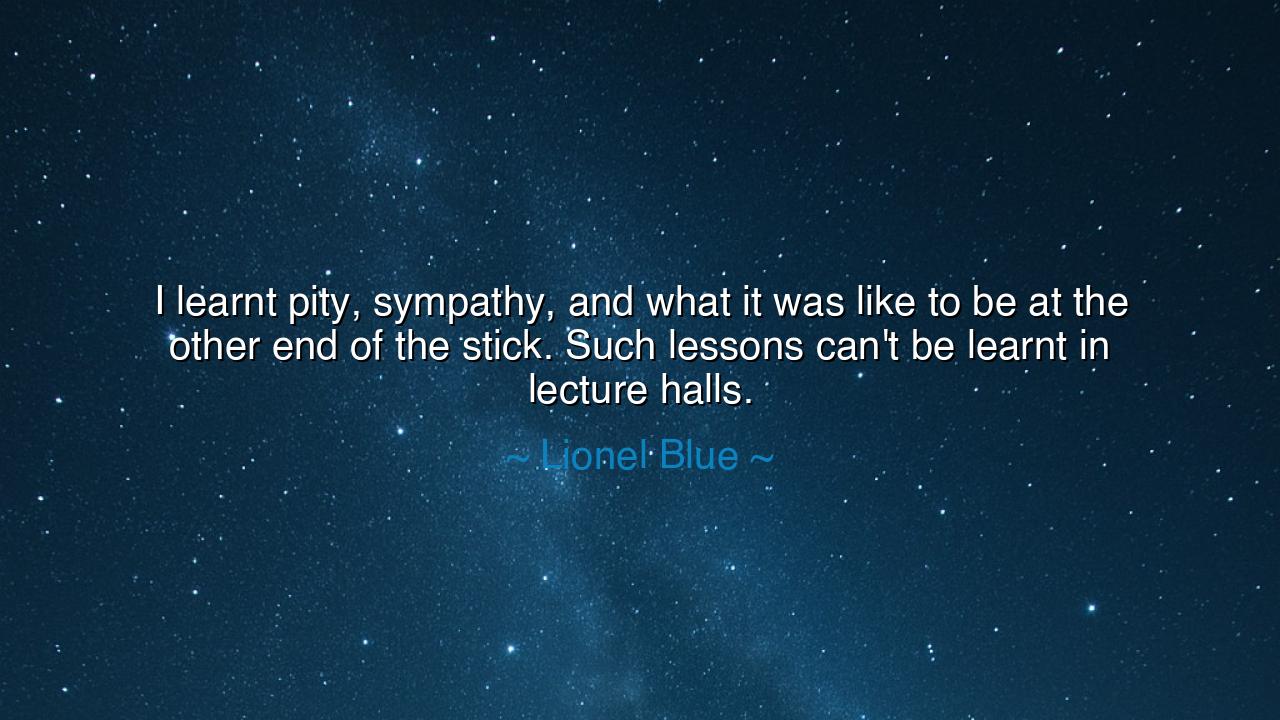
I learnt pity, sympathy, and what it was like to be at the other
I learnt pity, sympathy, and what it was like to be at the other end of the stick. Such lessons can't be learnt in lecture halls.






Hear the words of Lionel Blue, rabbi and teacher, whose wisdom was born not only from books but from life itself. He declared: “I learnt pity, sympathy, and what it was like to be at the other end of the stick. Such lessons can’t be learnt in lecture halls.” These words strike like a bell upon the heart, reminding us that the greatest truths are not written upon chalkboards or etched into scrolls, but carved into the soul by suffering, humility, and compassion.
When he speaks of pity and sympathy, Lionel Blue does not mean the shallow kind that pities from a distance. He means the kind born of experience—of having once stood weak, judged, or broken, and from that place, learning to recognize the same pain in others. To be at “the other end of the stick” is to feel not the hand of power, but the blow of power; not to strike, but to be struck; not to command, but to endure. Such experiences cannot be taught by professors or mastered through reading—they must be lived.
The origin of his words lies in his own life, for Lionel Blue faced hardship, illness, and inner battles that taught him tenderness toward the struggles of others. He knew what it was to falter and to rise again, and from this knowledge came his ability to guide others. Just as iron is tempered by fire, so too was his spirit tempered by the weight of hardship. This is why he declares that lecture halls cannot teach such truths: they can speak of compassion, but they cannot create it. It is only through wounds that one learns how to bandage the wounds of another.
History gives us many mirrors for this truth. Consider the tale of Nelson Mandela, who, though imprisoned for decades, emerged without bitterness, but with the strength to forgive. In his captivity, he came to know what it meant to be utterly powerless, to live at the mercy of others. From that place, he learned sympathy and pity for the oppressed of all nations. No lecture could have taught him this; it was the crucible of suffering that gave him the wisdom to heal a nation divided by hate.
The deeper meaning is that wisdom is not found only in knowledge but in experience. A man may memorize the words of philosophers, yet be cruel to those around him. Another may never open a book, yet through hardship and love, he learns how to bind wounds, soothe hearts, and lift burdens. Lionel Blue reminds us that the deepest lessons—those of compassion, humility, and shared humanity—come not from being told what is right, but from having lived what is wrong, and having felt the weight of it upon oneself.
Beloved listener, take this lesson into your own heart. Do not despise your hardships, for they may be your greatest teachers. When you feel the sting of injustice, remember that you are being taught to recognize it in others. When you feel loneliness or despair, remember that you are learning how to comfort those who suffer the same. Life will often place you “at the other end of the stick,” but if you endure with open eyes, you will emerge not hardened, but softened, made more human and more able to love.
Therefore, in your daily life, seek not only knowledge from books and teachers, but also wisdom from experience. Cherish the lessons you learn in silence, in sorrow, and in trial, for these are the ones that shape your heart. Offer not shallow pity, but true sympathy born of understanding. And when you find others struggling, remember the blows you yourself have endured, and let that memory guide your hand to gentleness.
Thus the teaching of Lionel Blue endures: that the greatest lecture hall is life itself, and its most powerful teacher is suffering transformed into compassion. Let your wounds become wisdom, your scars become strength, and your hardships become the source of your deepest humanity. For only then will you truly understand the meaning of pity and sympathy, and only then will you be ready to console others with a love that no book could ever teach.






AAdministratorAdministrator
Welcome, honored guests. Please leave a comment, we will respond soon